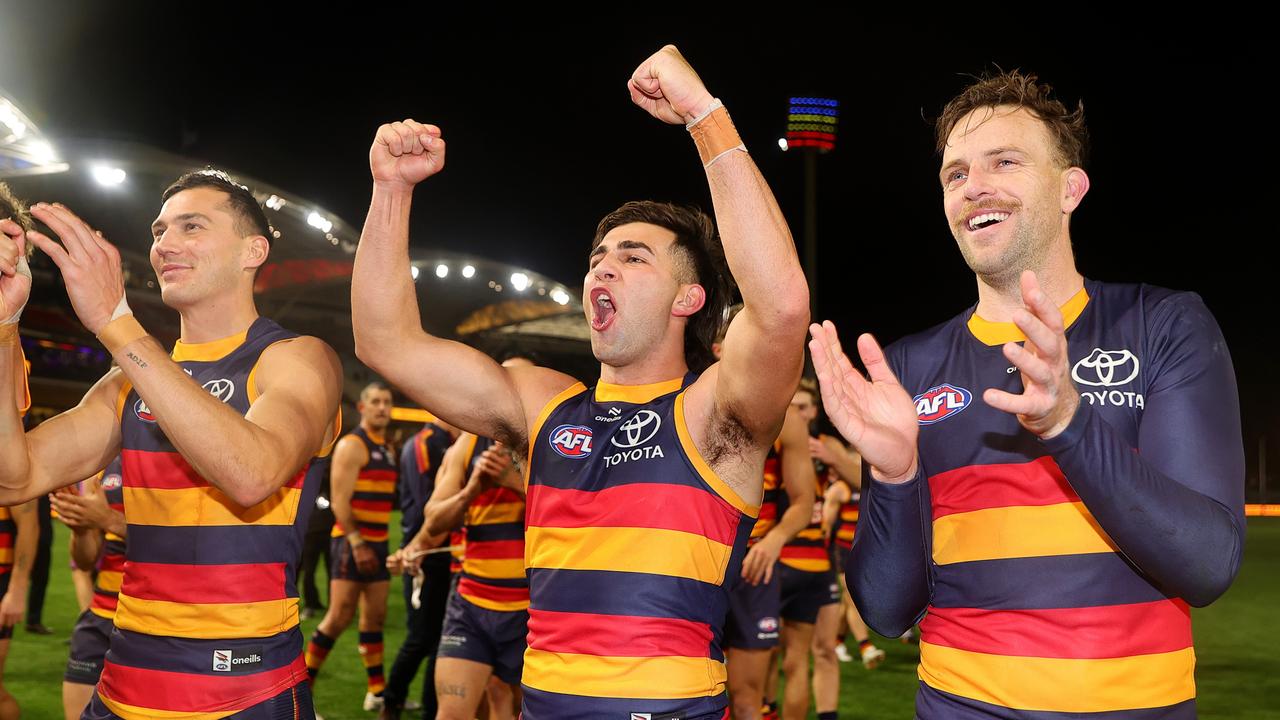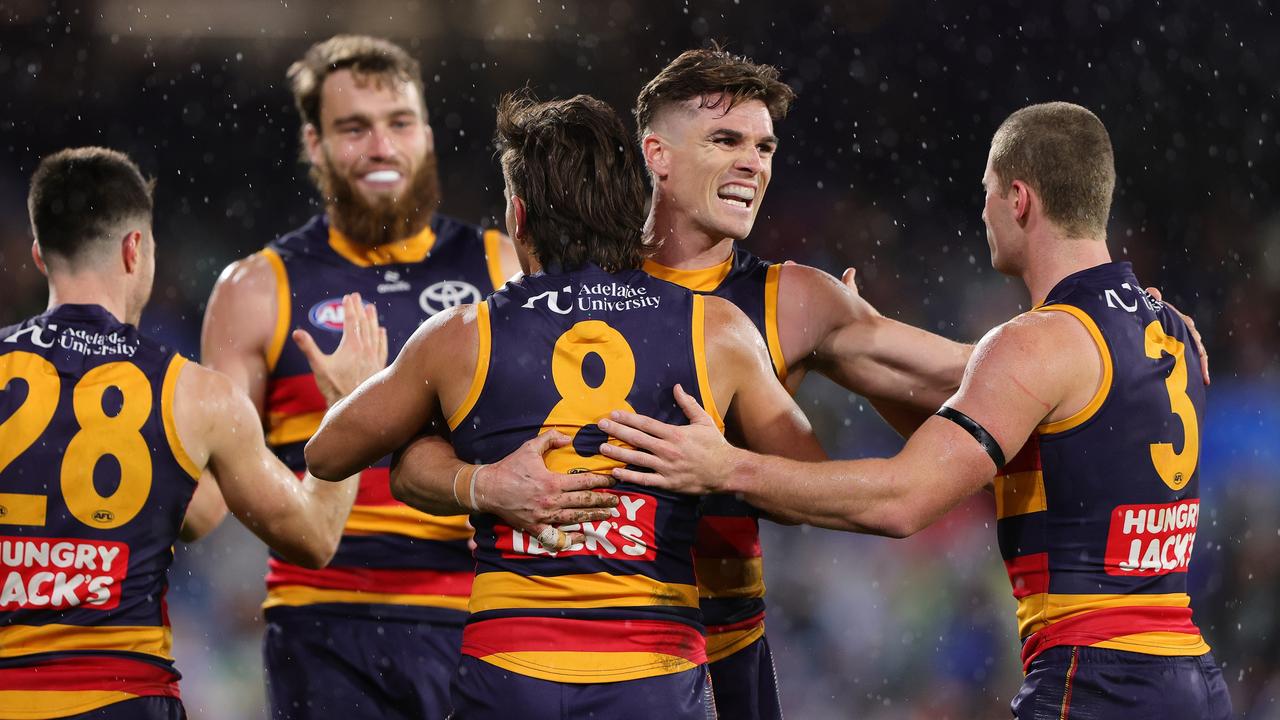How Greg Swann helped rebuild the Brisbane Lions from obscurity over 11 years
When Greg Swann arrived at the Brisbane Lions he was warned: ‘You’ll know if you’ve done a good job when we come out to play and don’t get booed’. This is how he transformed the club.
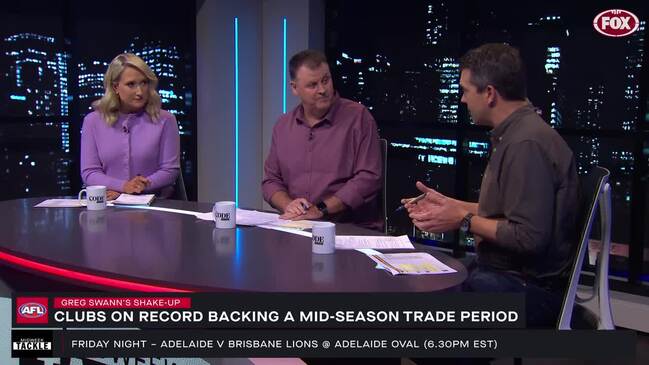
Lions
Don't miss out on the headlines from Lions. Followed categories will be added to My News.
When Greg Swann first walked through the door at the Brisbane Lions, then-ruckman Stefan Martin told him: “You’ll know if you’ve done a good job when we come out to play and don’t get booed at our home ground.”
It sounds laughable now. But that was Brisbane’s benchmark for success in July of 2014 when Swann was parachuted into the Gabba at the behest of AFL House to save the struggling Queensland club.
Back then it was AFL chief executive Gillon McLachlan who came knocking with a plea for Swann to save the day. More than a decade later and his successor, Andrew Dillon, has called on Swann once again – this time to come home.
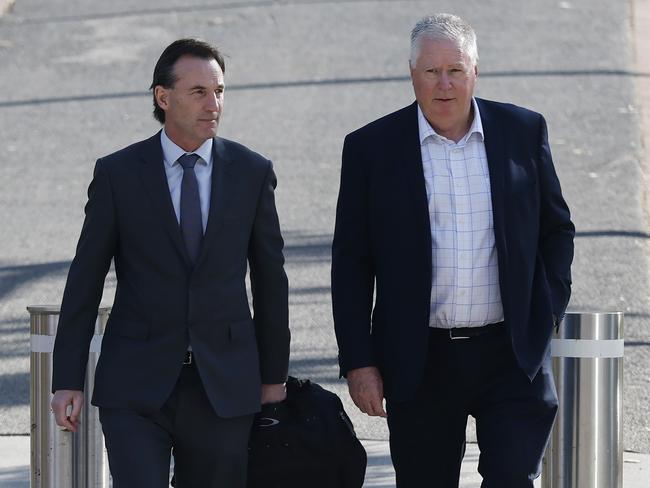
Brisbane’s CEO will bring up his 11 years of service to the club later this month, before returning to Melbourne to sit alongside Dillon as the AFL’s head of football operations in a major coup for league office.
Like his previous appointments at Collingwood, Carlton and Brisbane, Swann’s arrival comes at a critical juncture. There is a mess to clean up and few in the industry are as capable as he is to do so.
The 63-year-old accountant-turned-administrator has never taken the easy road.
Collingwood was at close to its lowest point when Swann arrived at the end of 1999, off the back of a wooden spoon-winning 4-18 campaign.
By the end of his fourth season in charge, the Magpies had contested back-to-back grand finals.
Under his stewardship, the club moved from Victoria Park to Olympic Park and Swann oversaw the subsequent construction of the Lexus Centre.
The Magpies were back on top of the football world when he flew to Sydney to tell club president Eddie McGuire that he was jumping ship to Carlton.
It was not a popular decision among the Collingwood faithful – and certainly not easy street for Swann.
He arrived at the Blues following back-to-back wooden spoon campaigns and left having overseen four finals appearances in seven seasons.
The club bolstered its membership base, redeveloped the training facility at Princes Park and landed perhaps the biggest trade coup in history with the arrival of Chris Judd.
After righting the ship of the two biggest clubs in the country, how difficult could it be to do the same in Brisbane?
On his very first night in the Queensland capital, Swann got a taste. He turned the radio on and … crickets.
No Lions. No footy. Nothing. The club was irrelevant. The fans, as Martin told him, were more likely to boo than cheer.
Eleven years later, Swann leaves the Lions with a lasting legacy like few before him: Two AFLW premierships, an AFL premiership, record membership, an $80m elite high performance facility and a soon-to-be-built 63,000-seat stadium for the club to call home from 2032.
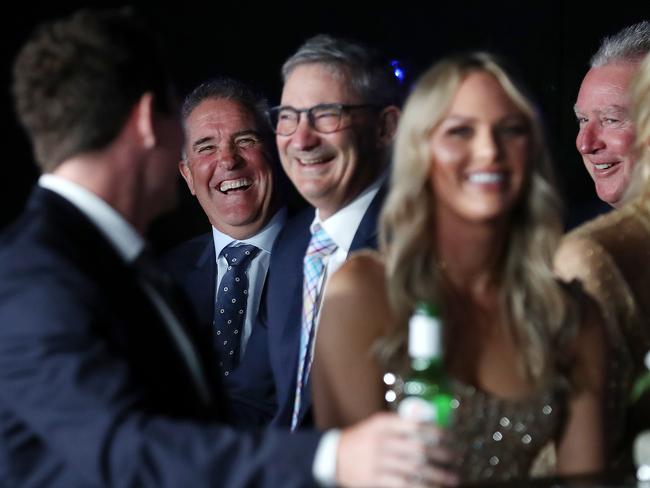
“He has changed the club so much for the better,” Brisbane chairman Andrew Wellington told this masthead.
“If you look at where we were in 2014 when Greg joined us, it was a fairly low ebb for the club. And now you compare that to where we are today – I think in 2014 it would have been hard to imagine he could have been this successful.
“It is almost as if he has picked one problem off at a time.”
In 2014, Brisbane was just one of two clubs to have lost members from the previous year. Its 24,012 paid-up fans were more than only expansion clubs GWS and Gold Coast, who had just three and four seasons in the AFL to their names at that point.
Last year, the Lions achieved a 15.7 per cent year-on-year membership growth – the most of any club – and now sit 12th on the membership ladder, ahead of three Victorian clubs, with more than 63,000 members.
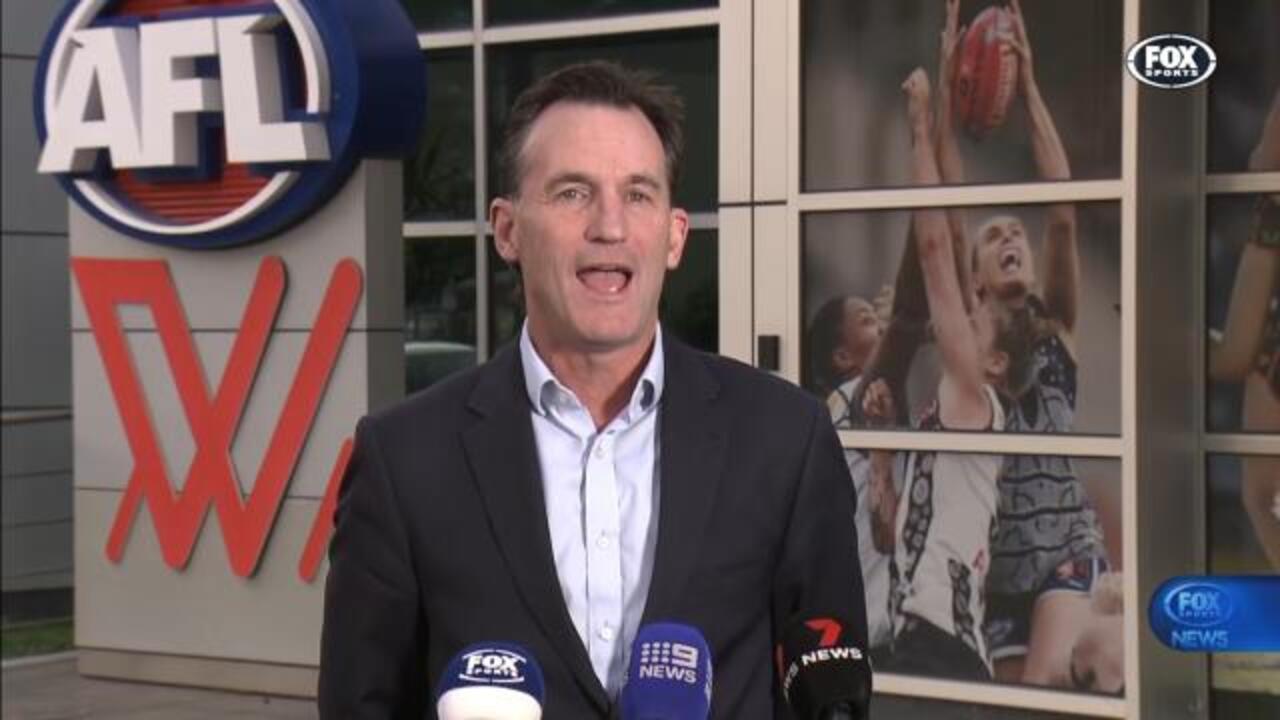
“Our debt probably peaked at about $18m I think in 2017 and by the end of this season, that will be completely paid off — that is a great feather in his (Swann’s) cap,” Wellington said.
“You look at average crowds at the Gabba, membership — all those key metrics are up. Look at Brighton Homes Arena at Springfield, that has been an absolute game changer for us. To get the funding for that lined up and get that executed was no easy feat.
“And of course in the last two years, probably a little more, we’ve had the stadium debate that he has helped shepherd us through.
“I’m probably not objective on this but I think it’s a great outcome for Queenslanders to now get that commitment to building a new stadium at Victoria Park, and we will now play in front of 63,000 fans hopefully at some point after 2032.
“All of these things, there are a lot of people other than Greg — and Greg would acknowledge that — who contributed to it. But Greg has been the CEO during that period, so he deserves a lot of credit for it.”
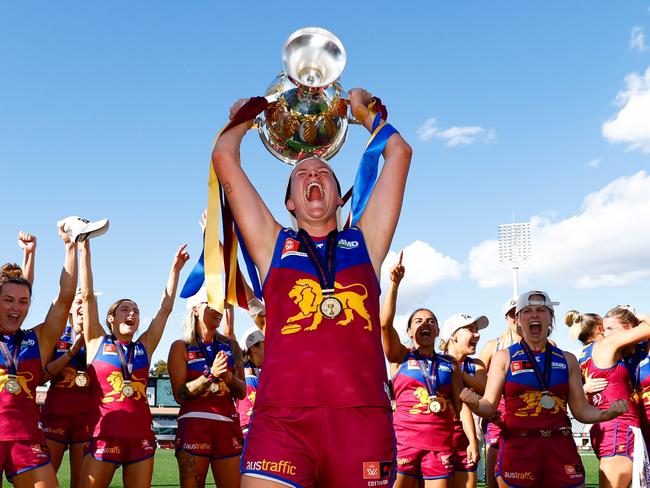
Swann is also a major advocate of the AFLW.
It is no coincidence that Brisbane quickly established itself as a powerhouse in the women’s football space, with head of football Breeanna Brock and senior coach Craig Starcevich forming one of the league’s most potent partnerships.
The Lions’ male and female football programs famously work hand-in-hand across many aspects of elite development.
It was stipulated very early on that the AFLW program would be treated with the respect it deserved and the $80m move to Springfield solidified that commitment.
“If you think about the AFLW as a new concept, Greg absolutely embraced it from day one. He really got behind Craig Starcevich and Breeanna Brock back then and empowered them and is a big part, I think, of why that program has been so successful,” Wellington said.
Not every decision of Swann’s has been a smashing success.
Wellington and the Brisbane board will occasionally remind him of “Brion the Lion” – the inflatable lion-shaped tunnel that replaced the traditional banner during the 2015 and 2016 seasons.
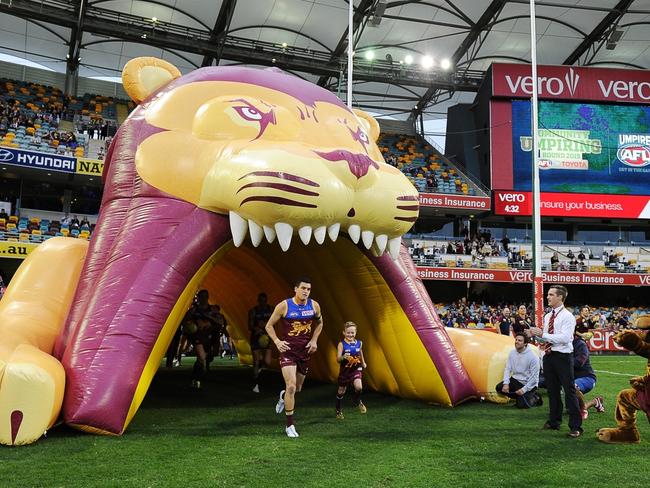
“We still joke with him about Brion the Lion,” laughed Wellington.
“We tell him it was (his brainchild). He certainly sold it to us at the board level. I think he told us they did it in college football in America. It certainly didn’t take off at the Gabba.
“I think poor old Brian might be residing somewhere in a cupboard under the Gabba these days.
“But Greg doesn’t take himself too seriously. We can laugh about those sort of things as well.”
It was a throw at the stumps that wildly missed the mark, but showed the club was willing to take risks to succeed.
Years later, the Lions’ match day offerings are the talk of Australian sport. Few clubs can claim to match the atmosphere of a 36,000-strong rendition of Country Roads after Charlie Cameron kicks a goal at the Gabba.
If Brion the Lion was Swann’s worst decision over 11 years in Brisbane, appointing Chris Fagan as senior coach was his very best.
In an interview with the Courier-Mail last year, Swann said recommending Fagan to the Brisbane board was “no doubt” one of his proudest decisions as an AFL administrator.
“He has obviously had many years in the game now, many years as a CEO and you could be forgiven for thinking that someone with that sort of profile might be a little bit conservative in the way they approached football and administration, but he has been anything but,” Wellington said of Swann.
“If you think about the decision to appoint Chris Fagan – he came to the board when we were at a low ebb, with a recommendation to appoint a coach that was in his 50s, never played at the highest level, never coached and the highest level … a few people raised their eyebrows at that.
“It was a brave decision but again, Greg didn’t just follow the tried and tested formula. He was brave enough to recommend something that was a bit different.”

Last year, after 25 years of service across Collingwood, Carlton and Brisbane, Swann finally got the AFL premiership he had longed for.
It did not come easily. The club began 2024 under fire, with an off-season trip placed under the microscope and a disastrous 2-5 start that had some questioning whether Fagan was still the right man for the job.
How the Lions lifted themselves from the canvas to salute on the last day in September was testament to the previous 10 years of trust and belief that had been built.
“He had a lot on his plate at the time, Chris. It was pretty stressful for him,” said Wellington, referencing Fagan’s mid-season health scare that almost saw him step back from coaching.
“So I think it is a reflection, probably of Greg in particular but the rest of us broadly as a leadership at the club, being calm and objective and talking to one another and being able to work our way through it.
“At the time we probably weren’t thinking we would go on to win the premiership. It was just getting through it unscathed and reset for the next year maybe. As it turned out, somewhat miraculously, we did manage to win the premiership.
“It does, I think, reflect on the power of relationships and having trust in one another. I certainly have a lot of trust in Greg and in Chris and I like to think between the three of us we have had a lot of trust in one another.”
Perhaps without that premiership success, Swann might not have felt content enough to take on his next great challenge at the AFL.
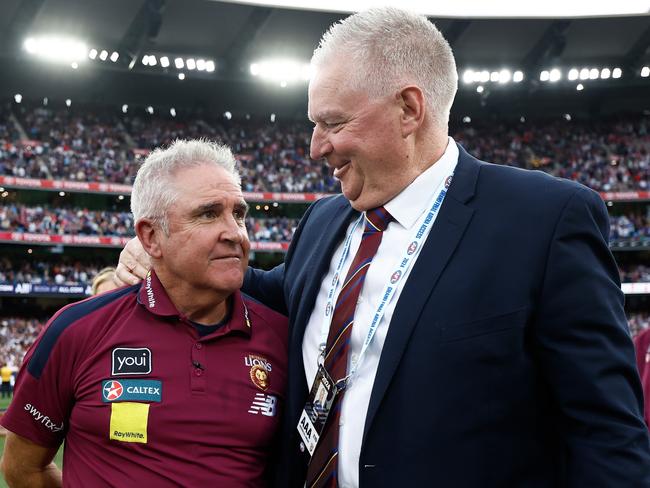
“He is one of those composed, calm and experienced people and I think he will be a great acquisition for the AFL,” Fagan said on AFL360 this week.
“He has been a great supporter of mine. He was obviously part of the panel that selected me to be the coach. We have a great friendship and I’m sure that will continue into the future.
“Swanny is a really knowledgeable person on football and is a person I’ve gone to on a regular basis to seek advice on various things to do with football, so I think he will be universally respected and bring a lot to the table (at the AFL).
“He will bring a great deal of knowledge and expertise to the AFL and another angle to decision making that perhaps hasn’t been there in recent times.”
More Coverage
Originally published as How Greg Swann helped rebuild the Brisbane Lions from obscurity over 11 years



